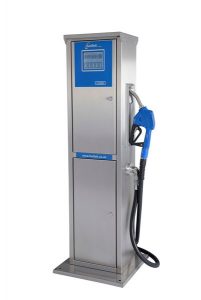What is AdBlue and Why Should I Use It
AdBlue is a non-flammable, non-toxic and biodegradable solution that has fast become recognised within the commercial transport industry. With the government targeting exhaust emissions through bringing in new regulations, AdBlue is becoming increasingly more common in vehicles.
At Fueltek, we have previously discussed the benefits of AdBlue, but with its rise in popularity due to the clampdown on how much gas is being emitted, we have compiled a more in-depth guide with everything you need to know!

What is AdBlue?
AdBlue is a colourless, non-toxic liquid solution used by some diesel engines with selective catalytic reduction to lower nitrogen oxide emissions. Made up of water and Urea, it is injected into the SCR catalyst in the vehicles exhaust system to break down soot and unburnt fuel into water and nitrogen, before harmful liquids can come out of the tailpipe, such as nitrogen oxide.
The liquid is 32.5% urea and 67.5% deionized water, with the latter working as a solvent to ensure the solid urea, (or colourless crystals) become a liquid solution.
Why AdBlue Works
AdBlue is directly put into a specially modified area of the vehicle’s exhaust, starting a chemical reaction which removes the polluting elements of the exhaust gas, converting them into nitrogen, carbon dioxide and water.
This results in better emissions figures, allowing them to pass more stringent standards. This process is called Selective Catalytic Reduction, or SCR and is only used in diesel engines. The more economical a vehicle is driven, the less AdBlue is used. Once AdBlue is injected, the exhaust emissions will consist only of nitrogen and oxygen, in which these natural gases pose no environmental risk.
How Often Does AdBlue Need Topping Up?
Most commonly, diesel vehicles will need topping up every 3,000 – 4,000 miles. If the AdBlue warning light is ignored, the AdBlue will run out, when the vehicle stops, it will not restart until it is replenished. Consumption varies from vehicle to vehicle.
What Are the Benefits of AdBlue?
One of the major benefits of using AdBlue is it reduces the emissions of mono-nitrogen oxide from vehicles. This in turn reduces the negative impact your vehicle has on the environment, allowing you to become eco-friendlier.
AdBlue not only improves the environment, it is also classified in the safe minimum risk category for fluids in the UK. Being a non-flammable substance, it is both safer and inexpensive.
AdBlue Storage Options for You
With the introduction of Euro 6 Emissions Standard, AdBlue is set to become more common within the transport industry. Due to this, it is imperative you have proper storage and monitoring for your AdBlue tanks, especially when controlling or managing a fleet.
At Fueltek, we have the ideal AdBlue storage solutions for you. Our Fueltek AdBlue pumps, such as the FT4000AB Commercial Vehicle AdBlue Pump, come with a 12-month part warranty and operate at a standard speed of 35 litres per minute. This product is the perfect solution for accurate dispensing and monitoring of your AdBlue tank.
The FT4000AB is available in a number of different configurations and can be specified as a pump or dispenser only. This has the ability to connect to any fuel management system through an in-built pulsed output. The monitoring system can monitor, and control three other external fuel pumps of any product type, even when integrated with the AdBlue pump.
At Fueltek, we understand the importance of tracking your solution usage. We offer a complete service, covering everything from the requirements of your site to standards relating to electricity or the environment. If you would like to know more about AdBlue storage tanks, pumps or other solutions at Fueltek, contact a member of the team today by calling 01254 291391 or emailing sales@fueltek.co.uk for more detailed information.







